Overview
This article offers essential insights into the process of filing VA disability claims for tinnitus, recognizing the challenges that veterans face. We understand that navigating this journey can be overwhelming, but we're here to help. The focus is on how technology and support systems can enhance your chances of success.
Turnout's AI-driven platform simplifies the application process, making it more accessible for you. It encourages thorough documentation of your symptoms, which is crucial in strengthening your claim. Additionally, the platform provides guidance on navigating upcoming changes in VA evaluation criteria, ensuring you are well-prepared.
Ultimately, our goal is to improve the quality of life for veterans affected by tinnitus. You are not alone in this journey, and with the right tools and support, we can work together to achieve a positive outcome.
Introduction
Navigating the complexities of VA disability claims for tinnitus can feel overwhelming for many veterans. With over 3.6 million former service members currently receiving benefits for this condition, understanding the nuances of the claims process is crucial. We recognize that this journey can be challenging, and it's essential to equip yourself with the right information to optimize your support and compensation. This article delves into essential insights aimed at empowering you to advocate for your rights effectively.
How can you ensure that you are adequately prepared to face the evolving landscape of tinnitus-related benefits? You're not alone in this journey, and we're here to help.
Turnout: Streamlining VA Disability Claims for Tinnitus
Turnout is transforming how former service members navigate requests for tinnitus VA disability by harnessing the power of AI technology. This innovative platform is designed to simplify the application process, ensuring that former service members receive the timely assistance and accurate support they deserve. With a user-friendly interface, individuals can easily submit requests and track their progress, alleviating the anxiety often associated with administrative hurdles.
We understand that navigating these processes can be overwhelming. With dedicated supporters working alongside AI, former service members can anticipate a streamlined experience that prioritizes their needs and significantly enhances their chances of a successful application. The integration of AI not only speeds up processing times but also improves the accuracy of submissions, reflecting a commitment to providing service members the support they merit.
Moreover, Turnout encourages former service members to connect the ringing in their ears to conditions related to tinnitus VA disability, which can significantly boost their VA ratings and compensation. This ensures that they can fully optimize their benefits. Remember, you are not alone in this journey; we're here to help you every step of the way.
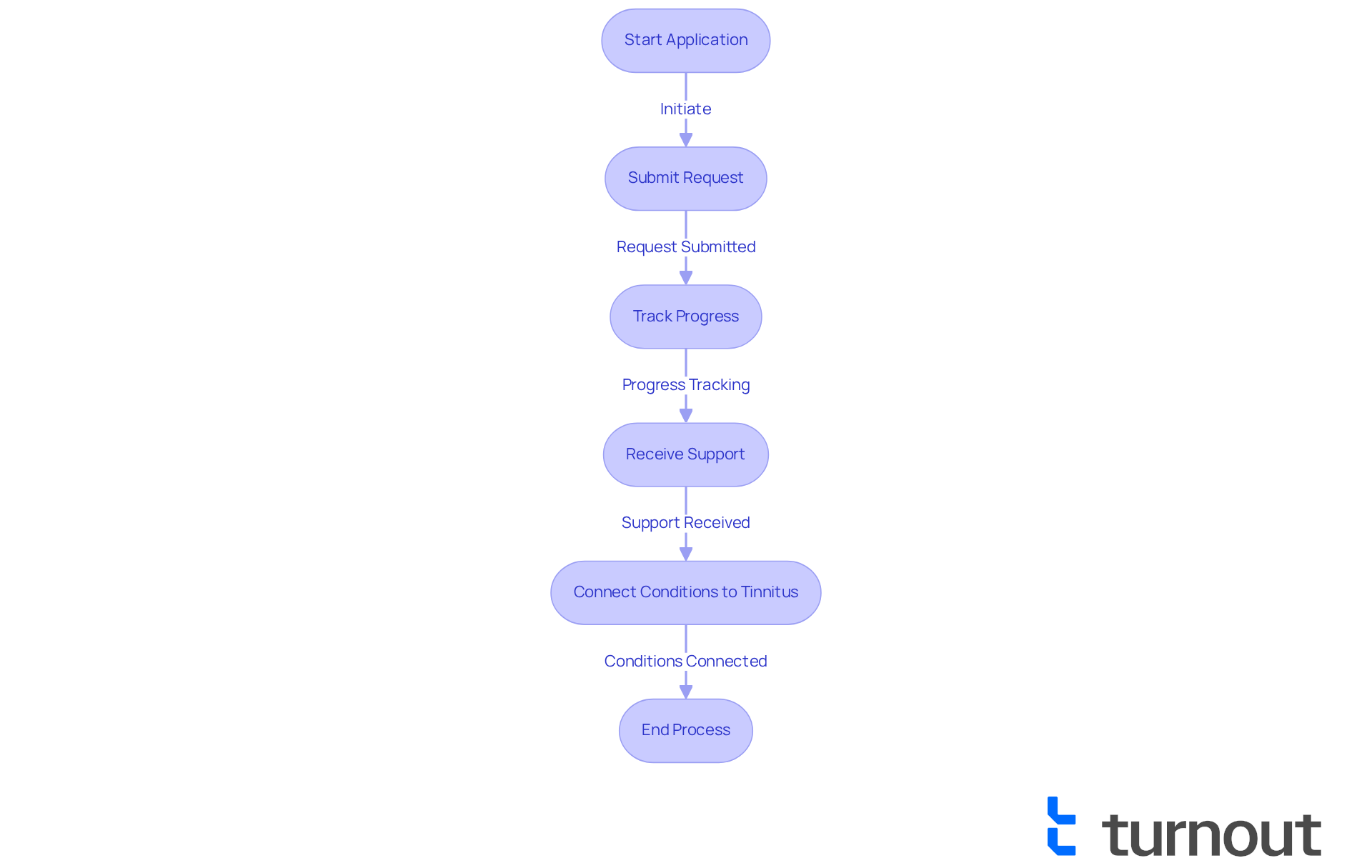
Tinnitus Symptoms: Recognizing the Signs for VA Claims
Tinnitus can be a challenging experience, often manifesting as ringing, buzzing, or hissing sounds in the ears. The intensity and duration of these sounds can vary, making it essential for veterans to be vigilant about common symptoms. You might find it difficult to concentrate, struggle with sleep disturbances, or notice an increased sensitivity to sound. These indicators are crucial when organizing your applications for tinnitus VA disability, as they help demonstrate how tinnitus affects your daily life and overall health.
Many former service members report that the ringing in their ears significantly disrupts their quality of life, leading to feelings of anxiety, irritability, and even depression. As audiologist Trista Williams points out, "Some say it makes their lives miserable." Recording your experiences can strengthen your claims. Real-world accounts show that those who effectively communicate the seriousness of their symptoms are more likely to receive the support they need.
With over 3.6 million former military personnel currently receiving VA disability benefits for tinnitus VA disability or hearing impairment, it's important to recognize these signs as part of a successful navigation process. Did you know that about 10% of U.S. adults experience ringing lasting at least five minutes in the past year? This statistic highlights how common tinnitus is, and understanding it is the first step toward seeking help.
As you prepare your application, gather specific types of evidence, such as:
- Service documents
- Medical files
- Statements from healthcare providers
We're here to help you through this journey, ensuring you have the resources you need to substantiate your claims effectively. Remember, you are not alone in this process.
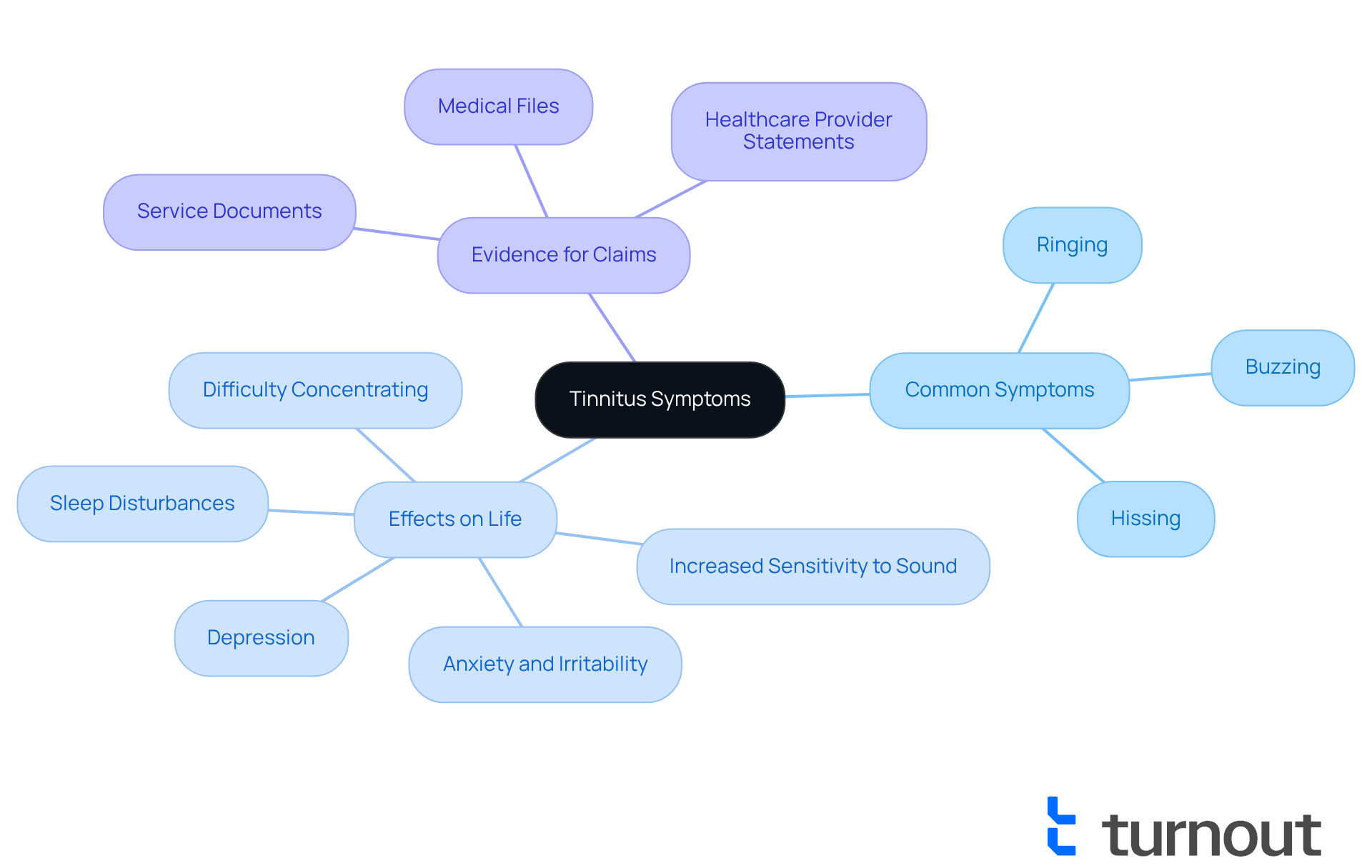
VA Evaluation Criteria: How Tinnitus Claims Are Assessed
The VA evaluates claims for tinnitus va disability primarily based on the severity of the condition and its impact on daily life. We understand that this can be a challenging experience, and several key factors come into play. These include the frequency and intensity of symptoms, along with any related functional impairments. Veterans are encouraged to provide detailed descriptions of how ringing in the ears affects their daily activities, work performance, and social interactions.
For instance, a veteran from the Marine Corps successfully argued that his hearing condition stemmed from service-related hypertension, supported by medical literature linking antihypertensive medications to such hearing issues. This case underscores the importance of establishing a clear connection between service and the condition.
The VA assigns a maximum disability rating of 10% for ringing in the ears, regardless of whether one or both ears are affected. However, if hearing impairment is also present and compensable at 10% or greater, ringing in the ears may be considered part of that condition and not assessed separately. This means that former service members with non-compensable hearing impairment (0%) may still qualify for a 10% rating for ringing in the ears if it relates to that hearing loss.
Understanding these criteria can significantly enhance the chances of a successful claim. As one VA representative noted, "The comprehensiveness of the evidence submitted by veterans plays a vital role in the evaluation of hearing-related requests." We encourage veterans to gather thorough documentation, including audiology test results and personal accounts that explain how ringing in the ears impacts their lives. This can greatly strengthen their requests.
Remember, you are not alone in this journey, and we’re here to help you navigate the process.
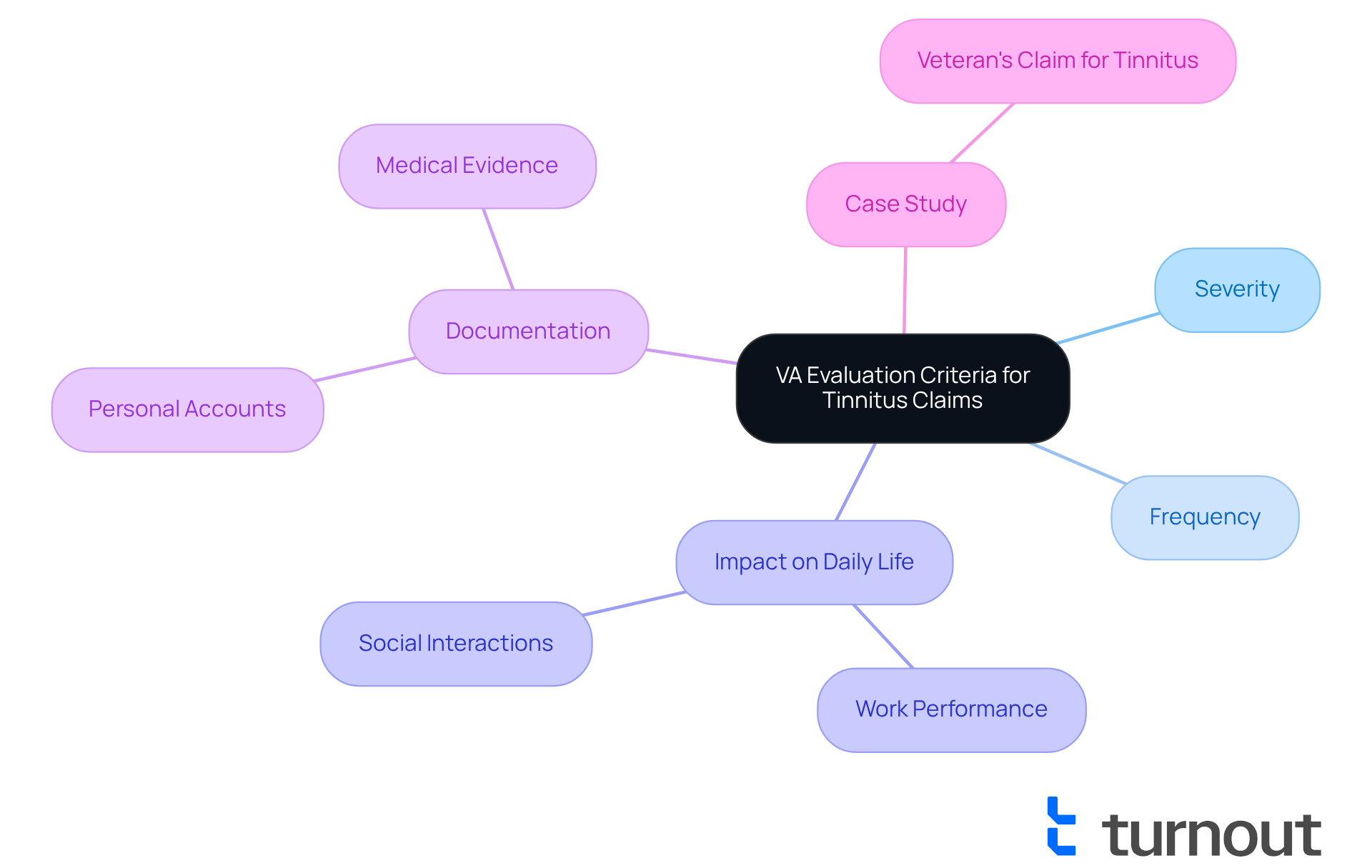
Filing a VA Disability Claim for Tinnitus: Step-by-Step Guide
Submitting a request for tinnitus VA disability can feel overwhelming, but you are not alone in this journey. Here are some key steps to guide you:
- Gather necessary documentation, including medical records and personal statements that detail your symptoms and their impact on daily life.
- Complete the VA Form 21-526EZ, ensuring all information is accurate and thorough to avoid delays.
- Submit the request online through the VA's website or by mail, as Fully Developed Claims (FDCs) can accelerate processing.
- Monitor the status of your request regularly and respond quickly to any inquiries for further information.
It's common to feel anxious during this process. The average time to complete a VA disability claim is approximately 141.5 days, but claims processed outside the U.S. take significantly longer, averaging 194.47 days. Tinnitus VA disability is the most prevalent service-connected disability among former military personnel, affecting over 2.9 million individuals.
Many veterans have shared that providing comprehensive medical evidence and personal testimonies significantly improved their chances of success. One individual remarked, 'They got my disability rating after I was denied twice.' They understood precisely how to structure and submit the request.
Additionally, consider submitting extra requests concerning tinnitus VA disability, which can greatly enhance your total VA rating and benefits. By following these steps, you can enhance your likelihood of approval and ensure that you receive the benefits you deserve. Remember, we’re here to help you every step of the way.
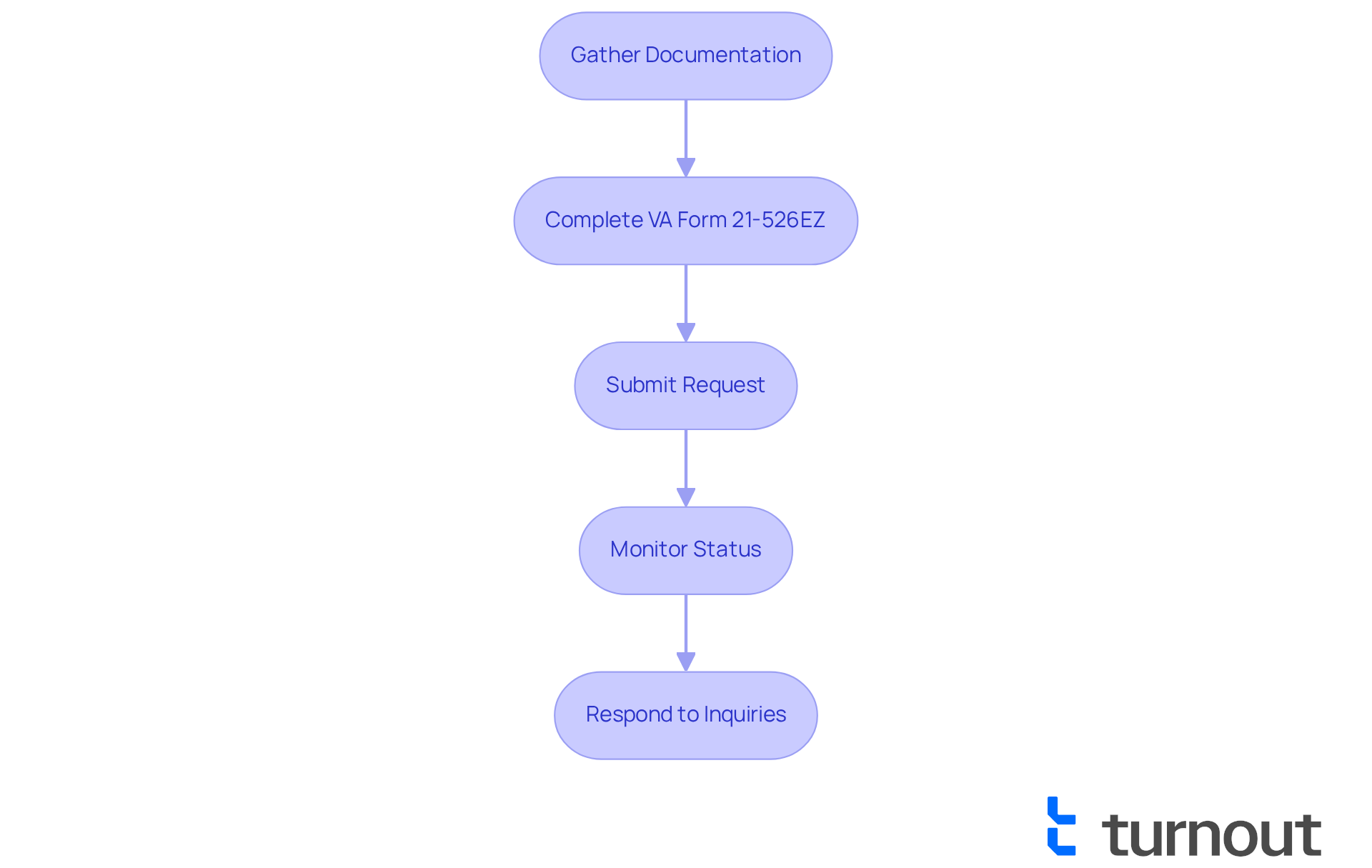
Upcoming Changes: What Veterans Should Know About VA Tinnitus Ratings
Veterans, we understand how challenging it can be to stay informed about upcoming modifications to VA hearing-related ratings that could significantly impact your requests. Recent discussions within the VA have centered on changing the criteria for assessing the severity of tinnitus VA disability. This shift may alter how benefits are distributed. For instance, the proposed removal of the standalone 10% rating for ringing in the ears, anticipated to take effect after April 2025, means that former service members will need to link their compensation requests for ear ringing to other compensable conditions, like hearing impairment or traumatic brain injury. This change reflects a broader trend within the VA's approach to disability evaluations, recognizing ringing in the ears as a symptom rather than a separate condition.
Traditionally, many veterans have successfully claimed compensation for tinnitus VA disability based on its individual rating. However, as the VA updates its criteria to align with modern medical understanding, we encourage you to adapt your submission strategies. Those currently rated for tinnitus will be grandfathered in, ensuring they keep their benefits. Yet, new claimants may encounter additional challenges.
To navigate these changes effectively, we recommend gathering strong medical evidence and seeking advice from experienced professionals who can guide you through the evolving landscape of VA disability applications, particularly regarding tinnitus VA disability. As Brian Reese, a dedicated disability specialist, emphasizes, "A proven formula that has assisted over 25,000 service members achieve their VA disability approvals more quickly is Strategy + Education + Medical Evidence = VA Rating and Compensation You Deserve FASTER!" Staying informed about these developments is essential for advocating for your rights and securing the benefits you deserve. Remember, you are not alone in this journey; we are here to help.
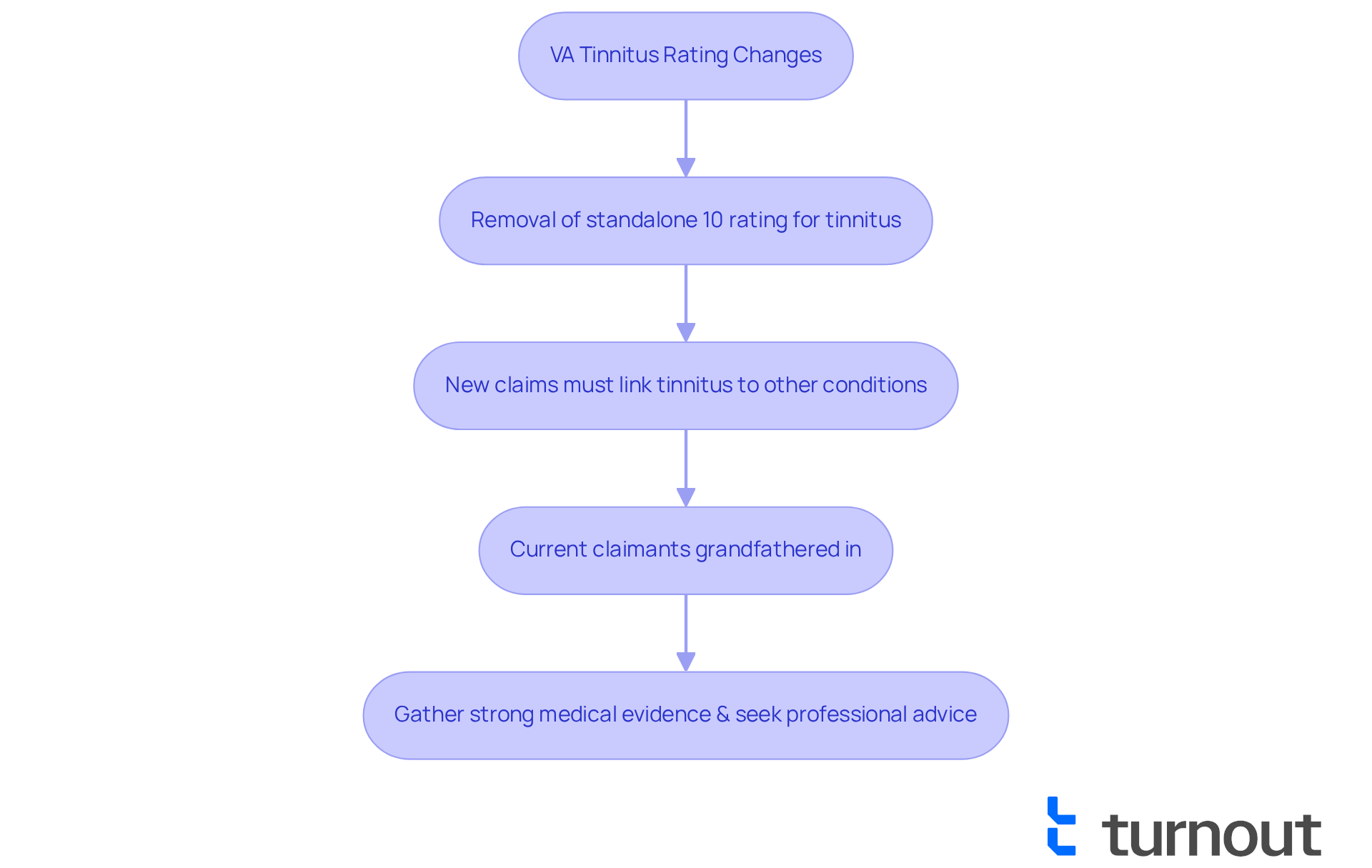
Secondary Conditions: How Tinnitus Affects Other Health Issues
Tinnitus can often lead to or worsen secondary health conditions, such as anxiety, depression, and sleep disorders. We understand that veterans facing these challenges may feel overwhelmed, and it’s crucial to document these issues in their claims. These conditions can profoundly impact overall quality of life. Research indicates that about 33% of individuals with ringing in the ears also experience depression, while approximately 79.1% of veterans with this condition have been diagnosed with anxiety. This highlights the interconnectedness of these disorders.
Mental health experts emphasize the importance of comprehensive management approaches. The ongoing ringing in the ears can create a cycle of stress and helplessness, further intensifying anxiety levels. As Brian Reese noted, "Many former military members don’t understand that they could be qualified to seek secondary conditions that are closely related to or worsened by their service-connected ear ringing." By clearly demonstrating how tinnitus va disability contributes to these additional conditions, veterans can strengthen their claims and improve their chances of receiving the benefits they deserve.
Moreover, the VA evaluates depression related to hearing issues on a scale from 0% to 100%, depending on severity and functional limitations. This underscores the importance of addressing these mental health concerns within the context of their petitions. Remember, you are not alone in this journey, and we’re here to help you navigate the process.
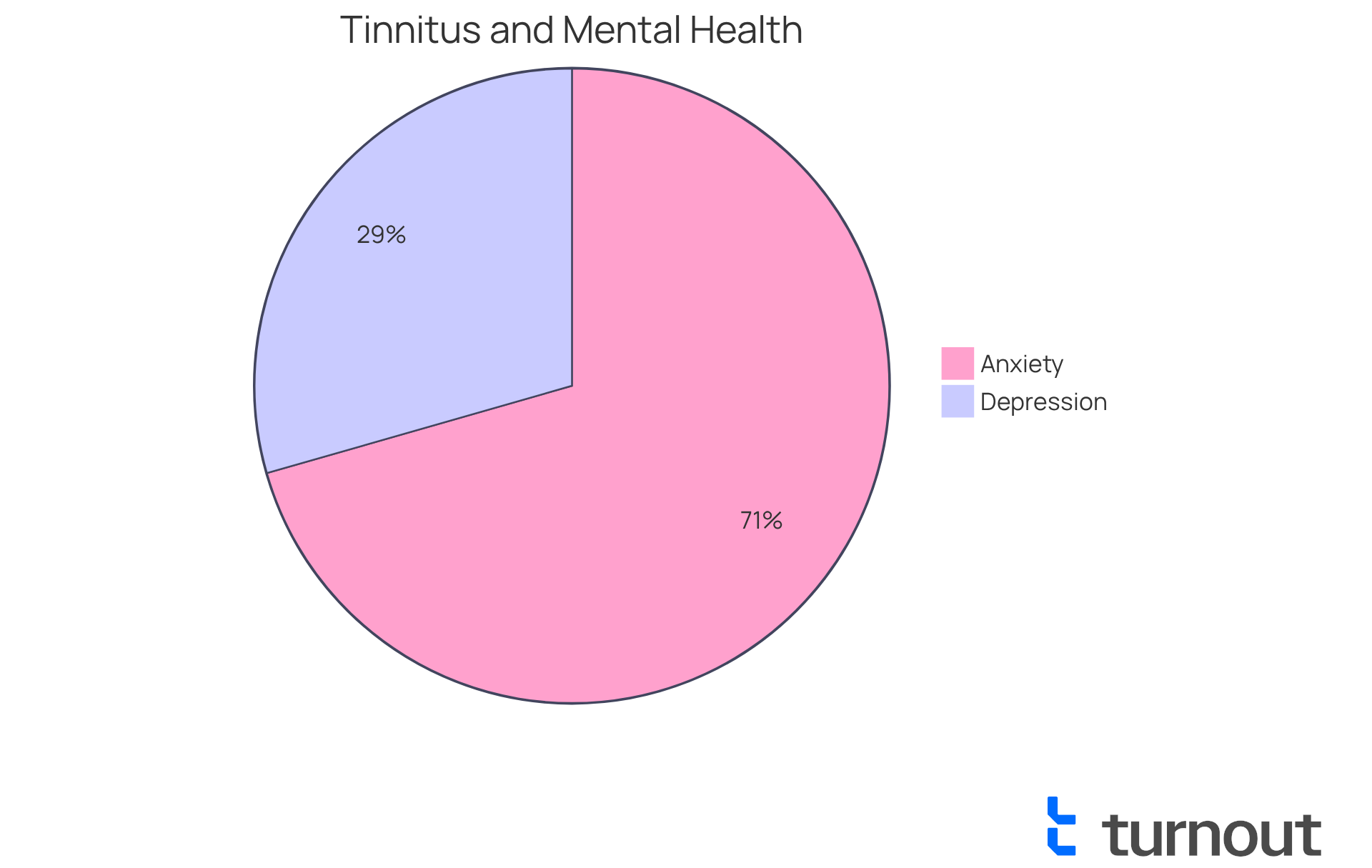
Importance of Supporting Statements in Tinnitus Claims
Supporting statements from relatives, companions, or medical professionals can significantly enhance your hearing condition request. These statements should detail how tinnitus va disability affects your daily life and emotional well-being. By incorporating these personal narratives, you can provide the VA with a clearer insight into your circumstances, helping them evaluate the legitimacy and seriousness of your request. Veterans who share comprehensive personal narratives often experience higher success rates in their applications compared to those who do not.
Consider describing specific instances where tinnitus va disability has disrupted your daily activities. For example, you might mention sleep disturbances or difficulties in communication. As Michallie K. Harrison notes, 'If you’re denied, lay statements from people who noticed your symptoms early on... can help confirm your story.' Additionally, including documents like performance evaluations or deployment records can further strengthen your case.
It's also important to recognize that requests can be rejected due to procedural issues, such as incomplete forms or missed deadlines. Ultimately, sharing personal narratives not only enhances your argument but also aligns with the VA's requirement for thorough evidence to validate your condition. Remember, you are not alone in this journey, and we’re here to help you every step of the way.
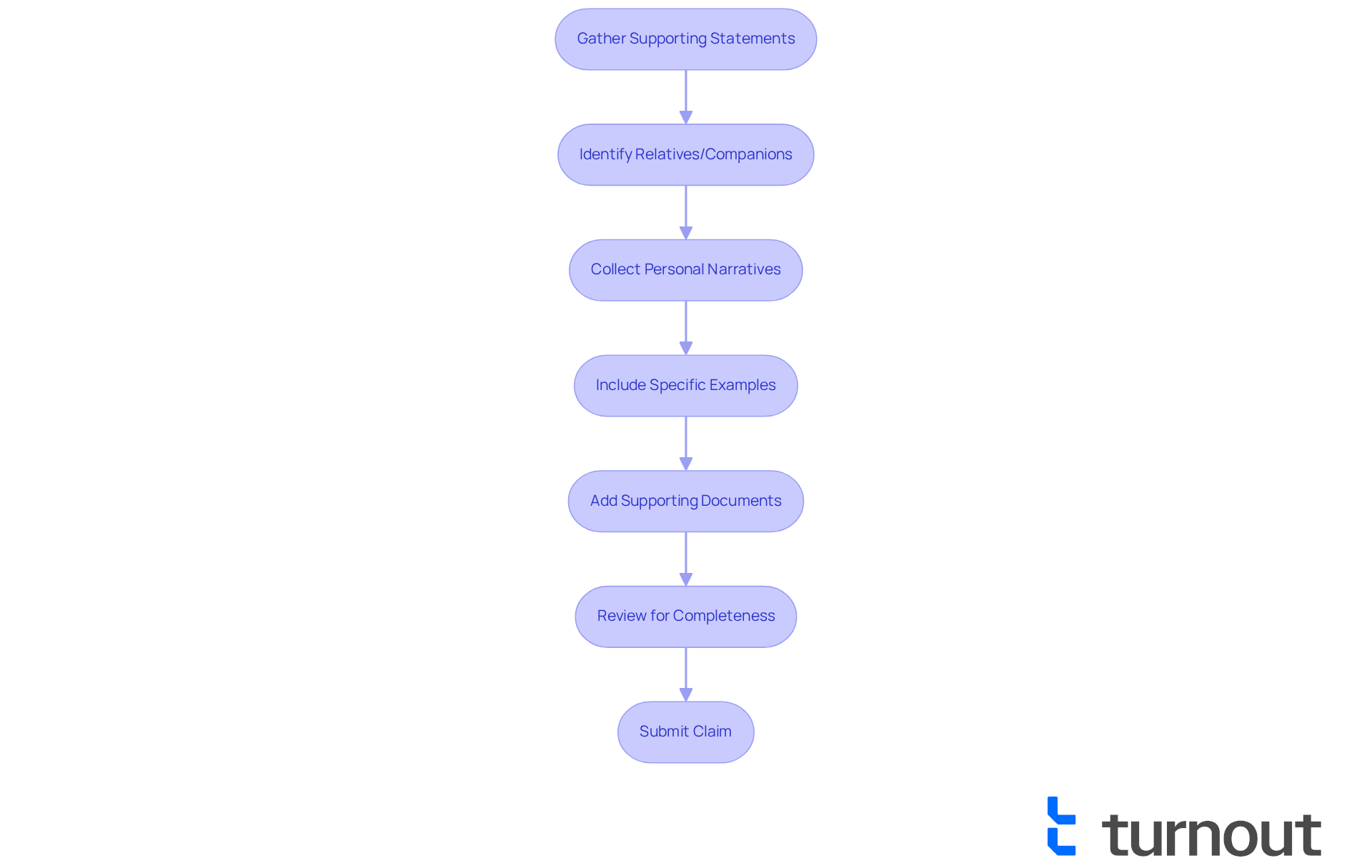
Legal Support: Navigating Tinnitus Claims with Professional Help
Navigating the VA application process can feel overwhelming. We understand that seeking help can be a daunting task, but reaching out to advocates who specialize in disability matters can make a significant difference. Turnout offers access to trained nonlawyer advocates who provide personalized guidance, ensuring that all necessary documentation is submitted accurately and on time.
These dedicated experts assist former military personnel in preparing for assessments and effectively addressing obstacles that may arise during the claims process. It's common to feel uncertain, but having someone by your side can alleviate much of that stress. For instance, individuals with military experience represented by advocates have shown a remarkable improvement in their success rates. Data reveals that those with professional assistance face a denial rate of only 14.8%, compared to the overall average of 20.3%. This underscores the importance of having informed supporters who understand the complexities of the system and can advocate for the needs of former service members.
Moreover, testimonials from veterans highlight how advocates have helped facilitate quicker claim approvals and provided essential support throughout the journey. You are not alone in this process; advocates are here to improve your chances of a successful outcome for tinnitus VA disability claims. Together, we can navigate this path toward a brighter future.
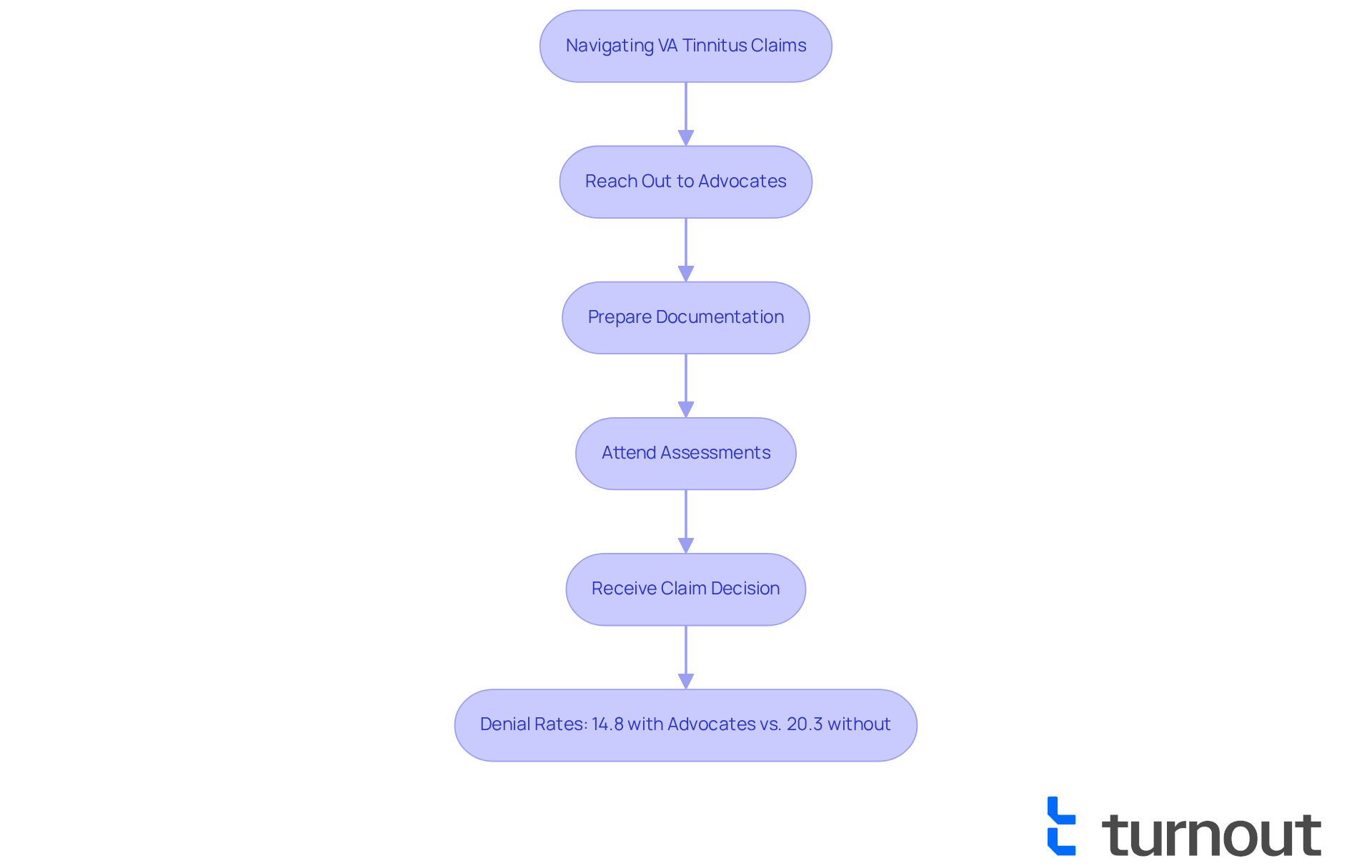
Quality of Life: The Impact of Tinnitus on Veterans
Tinnitus can profoundly disrupt a person's quality of life, making it difficult to concentrate, socialize, and perform daily activities. We understand that many former service members experience feelings of isolation and frustration due to their condition, which can lead to a reduced sense of well-being. For instance, around 30% of former service members report experiencing ringing in the ears, often noting that it interferes with their daily activities and social engagements. This emotional burden is clear in the accounts of those who share how the ringing impacts their relationships and overall mental well-being. By expressing these challenges, former service members can help the VA grasp the full impact of tinnitus va disability on their lives, which is crucial for determining appropriate benefits.
It's common to feel socially isolated when dealing with ringing in the ears, as many struggle to engage in social settings because of the persistent noise, further intensifying feelings of loneliness and distress. Moreover, Turnout offers guidance in navigating the application process for service members seeking benefits related to tinnitus va disability, providing resources and support that can alleviate some of the challenges associated with these issues. Remember, you are not alone in this journey, and we're here to help you find the assistance you need.
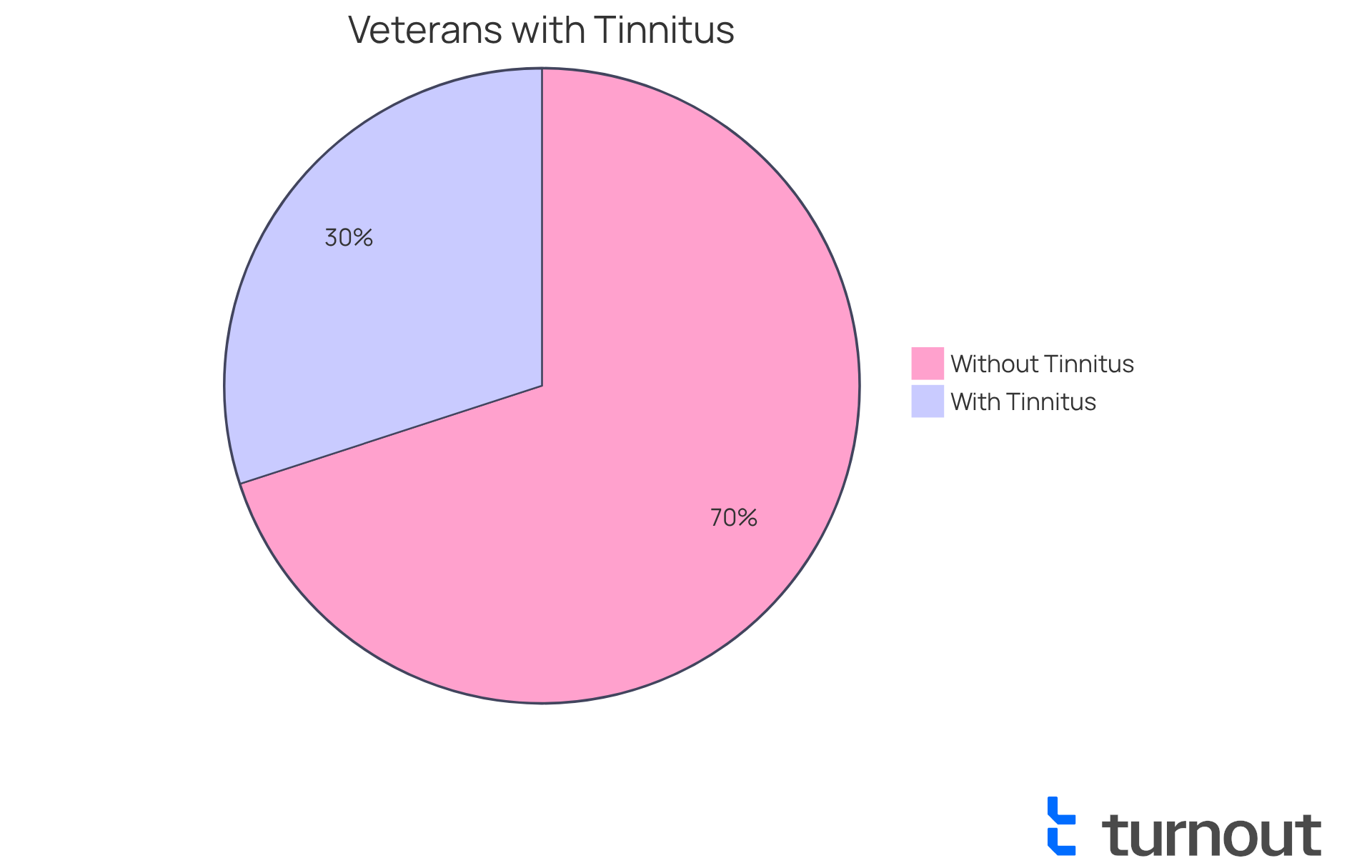
Resources for Veterans: Managing Tinnitus and Claiming Benefits
Veterans dealing with tinnitus va disability can find comfort in various resources designed to help them manage their condition and navigate the claims process with ease. The Department of Veterans Affairs (VA) provides various assistance services, including specialized groups and counseling for veterans facing tinnitus va disability. These groups not only provide emotional support but also share valuable information on coping strategies and treatment options.
In fiscal year 2023, claims related to tinnitus va disability accounted for 63% of auditory claims handled by the VA, highlighting the significant need for assistance in this area. Currently, over 2.9 million former service members are dealing with tinnitus va disability, and many of them turn to VA services to manage their symptoms. Research shows that veterans who engage with VA support services often report improved coping skills and a better quality of life.
Organizations like the National Center for Rehabilitative Auditory Research (NCRAR) and various advocacy groups for former service members play a crucial role in supporting individuals with hearing-related issues. These organizations provide educational resources, assistance in managing tinnitus va disability, and guidance through the application process, ensuring that former military personnel have the necessary tools to advocate for their rights and benefits.
Turnout's platform enhances this support by offering tailored assistance with claims, helping former service members navigate the often complex bureaucratic landscape. With trained nonlawyer advocates and IRS-licensed enrolled agents, Turnout simplifies access to government benefits and financial support, ensuring that veterans receive the guidance they need to secure the benefits they deserve.
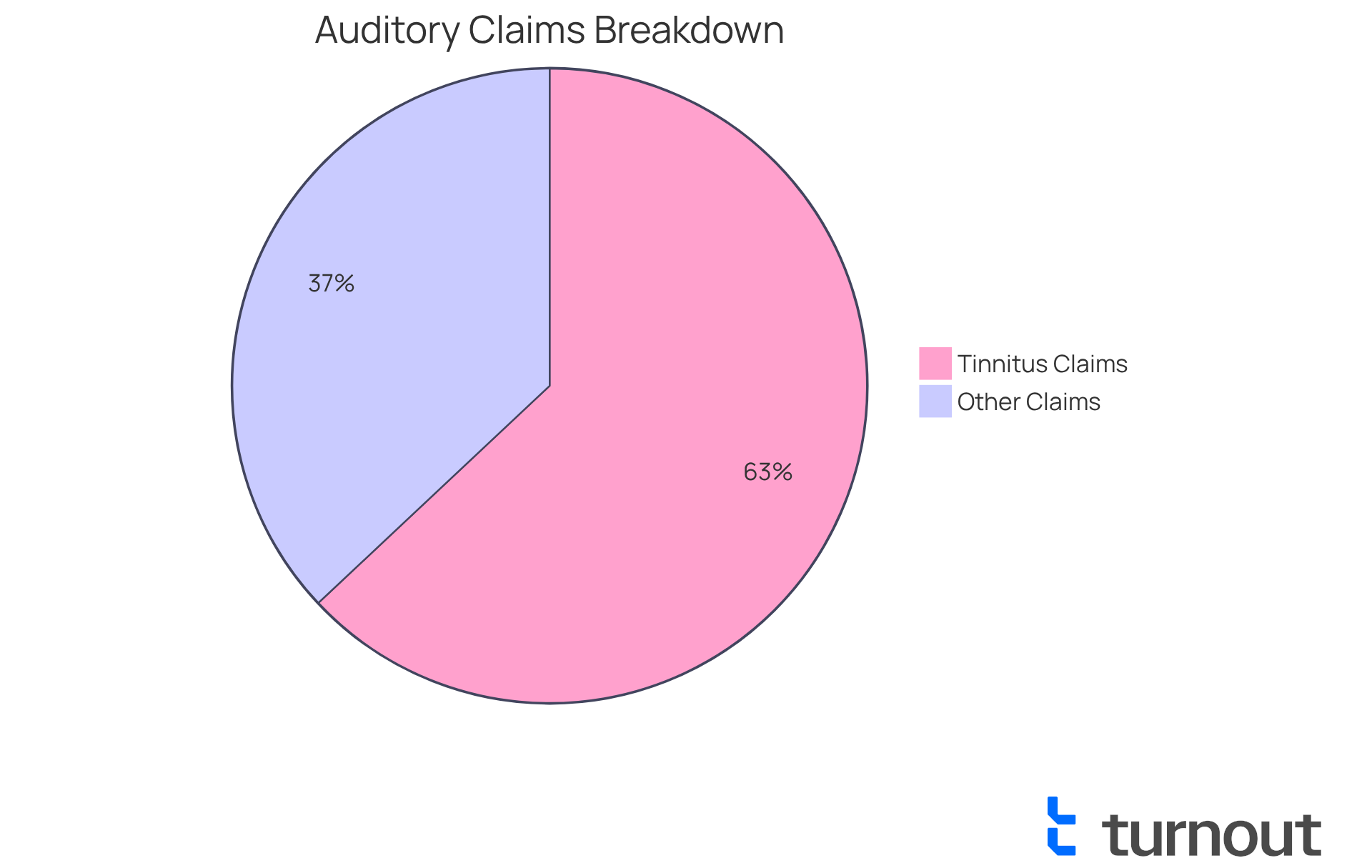
Conclusion
Navigating the complexities of tinnitus VA disability claims can feel overwhelming for veterans seeking the support they truly deserve. We understand that understanding the symptoms of tinnitus, the evaluation criteria used by the VA, and the importance of thorough documentation and personal narratives can significantly impact your claims. Resources like Turnout are available to help you streamline the application process and improve your chances of receiving the benefits you need.
Recognizing the impact of tinnitus on daily life is crucial, as well as understanding the potential for secondary conditions and the evolving landscape of VA ratings. As changes are anticipated in 2025 regarding how tinnitus is assessed, it’s vital to stay informed and adapt your claims strategies accordingly. Engaging with supportive resources and seeking professional help can greatly enhance your likelihood of a successful outcome in the claims process.
Ultimately, the journey to secure benefits for tinnitus should not be faced alone. You are encouraged to utilize the available resources and advocate for your rights, ensuring you receive the assistance needed to improve your quality of life. By taking proactive steps and leveraging the support of experts, you can navigate the complexities of tinnitus claims with confidence and clarity. Remember, you are not alone in this journey—we're here to help.
Frequently Asked Questions
What is Turnout and how does it help former service members with tinnitus VA disability claims?
Turnout is an innovative platform that streamlines the application process for tinnitus VA disability claims by using AI technology. It simplifies requests, allows users to track their progress, and enhances the overall experience for former service members seeking assistance.
How does AI technology improve the tinnitus claims process?
AI technology speeds up processing times and improves the accuracy of submissions, thereby increasing the chances of a successful application for former service members.
What symptoms should veterans recognize when applying for tinnitus VA disability?
Veterans should be vigilant about symptoms such as ringing, buzzing, or hissing sounds in the ears, difficulty concentrating, sleep disturbances, and increased sensitivity to sound, as these can affect their daily life and health.
How can veterans strengthen their tinnitus claims?
Veterans can strengthen their claims by recording their experiences with tinnitus, providing detailed descriptions of how it affects their daily activities, and gathering specific evidence such as service documents, medical files, and statements from healthcare providers.
What are the VA evaluation criteria for tinnitus claims?
The VA evaluates tinnitus claims based on the severity of the condition, frequency and intensity of symptoms, and their impact on daily life. Detailed accounts of how tinnitus affects work and social interactions are also important.
What is the maximum disability rating for tinnitus?
The maximum disability rating for tinnitus is 10%, regardless of whether it affects one or both ears. If a veteran has compensable hearing impairment, tinnitus may not be assessed separately.
What types of documentation should veterans gather to support their claims?
Veterans should gather thorough documentation, including audiology test results, service-related medical records, and personal accounts that explain the impact of tinnitus on their lives.




